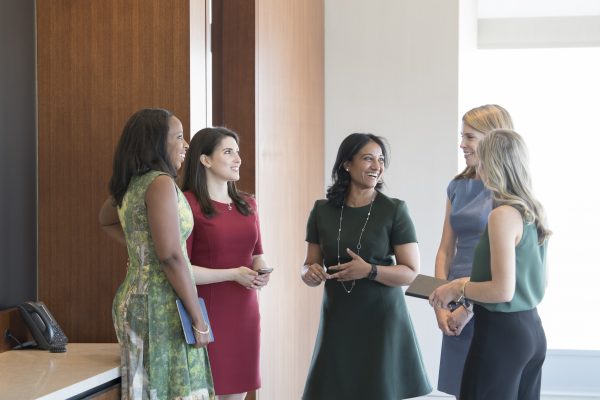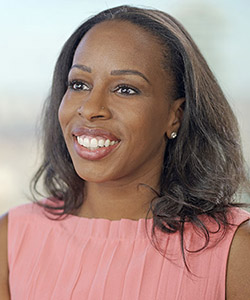
Last month, Launch With GS, Goldman Sachs’ commitment to invest $500 million in women-led companies and investment managers, celebrated its one-year anniversary.
The initiative aims to narrow the gender investing gap and build a global network of business leaders to facilitate connections, share ideas, and uncover opportunities.
Launch With GS was founded based on the view that diversity of gender, thought and background leads to outperformance, driving growth for Goldman Sachs’ clients, shareholders and communities. In this edition of The Glass Hammer, we spoke with three Goldman Sachs partners who are lead investors for Launch With GS on their approach to investing and their advice for entrepreneurs, as well as individuals interested in pursuing a career in investing. Meet the Goldman Sachs investors:
Nicole Agnew is a partner in the Merchant Banking Division and a lead investor for Launch With GS.
Stephanie Hui is head of the Merchant Banking Division in Asia Pacific. She is also on the Board of Advisors of Launch With GS.
Jo Natauri is a partner in the Merchant Banking Division and a lead investor for Launch With GS.
How do you think Launch With GS is helping to change the investing landscape?
Stephanie Hui: It’s not just about supporting diversity, it’s fundamentally good for business to have the whole investing ecosystem become more diverse. As an investor in Asia, I’ve seen that women have a more difficult time accessing capital than male entrepreneurs, and Launch With GS is particularly impactful because it helps transform the whole supply chain – we’re seeking out women entrepreneurs who are high potential and who require funding, but might not have received it through traditional means.
Nicole Agnew: I think it’s a great initiative that the firm has started to support and invest in female-founded and female-led businesses. The inbound interest has been very high, and we’ve seen that a network and community of female entrepreneurs is being developed around Launch – and we hope this ecosystem continues to grow to generate even more investing opportunities for female founders.
Jo Natauri: Launch With GS has helped to raise a level of awareness around the importance of diversity when evaluating potential transactions. Diversity is now a key factor we think about when moving forward with deals.
What factors help you decide to make an investment?
Jo: First and foremost, we evaluate if a potential investment is a good business – we look at industry trends, competitive dynamics, how the business is run, what if any, upsides there are to the business, and support the management team might need from investors.
Nicole: We are generally interested in businesses with a strong financial record, high return on capital, a growing top-line and strong margin performance. As a general philosophy, we love to back excellent management teams, and the talent that a business has is a very important factor as well.
Stephanie: We evaluate potential investments from both a top-down and bottoms-up perspective. Top-down refers to the size of the market, the growth potential of the sector, and the number of competitors and economics of the company. Bottoms-up means that we evaluate the quality of the management team, market positioning of the business, and “moat” around the business (e.g., distinguishing technology).
What advice do you have for people who want to go into investing?
Nicole: People who are happy and fulfilled in an investing role generally have a natural curiosity about businesses and want to go deep to learn how things work. Investing is also a relatively analytical business, so people with an ability to dissect information are more likely to be successful.
Stephanie: You should have a very long-term view if you’re interested in a career in investing, because typically investments take at least five years from gestation to fruition. You have to think about a career in decades – and the good thing about this business is, the longer you’re at it, the better you become as your judgement is refined over time.
Jo: It’s important to have a mix of skills sets. You need both analytical qualities in order to assess businesses, but you also need to be able to work well with others, such as the management teams of businesses you invest in.
What advice do you have for entrepreneurs / individuals interested in starting their own business?
Stephanie: Particularly for female entrepreneurs, it’s important to think big and evaluate how they can scale their business. I would also recommend that entrepreneurs develop a network around them that helps ensure they have support across all different specialties – it goes back to the old saying, ‘hire people who are more capable than yourself.’
Jo: The key is to remain open-minded, pay attention to how your industry is changing, and be able to adapt, particularly as technology continues to alter businesses.
Nicole: Number one, you have to be very passionate and ensure you’re well prepared to start your own business. In addition, people who are able to adapt and be flexible in their thinking and approach seem to be more likely to succeed.
What do you look for in a founding team?
Jo: Leadership teams that have a long-term vision and are able to execute on that vision are typically teams that we’re most interested in. It’s also important for management teams to be flexible and adapt, because every industry is constantly evolving and changing.
Stephanie: Being humble, down to earth and hard-working are characteristics we look for in founding teams. Complementary teams that are able to share feedback and have honest conversations with one another tend to be the teams that succeed.
What interesting market trends are you seeing / what opportunities do you expect?
Nicole: The traditional aspects of consumer and retail are being disrupted by technology and changing consumer preferences – businesses successful in these industries in the past are not necessarily growing today. As a result, we’re interested in companies that are focused on the experiences they’re providing to their customers, as opposed to solely the product.
Stephanie: The digitization of traditional businesses via e-commerce platforms and the availability of data is substantially changing the way we approach, understand and speak with customers. A second big trend is that the younger generation is very formidable in terms of spending. And third, social media is changing purchasing behavior – people now rely more on friends’ recommendations.
What are you passionate about outside of the office?
Stephanie: I have three teenage boys, and they’re my passion and focus outside of the office. I was previously on the board of the Women’s Foundation, which is an organization based in Hong Kong that advocates for the female population and diversity in the workforce in Hong Kong. In addition, I’m on the board of the Save the Children Hong Kong chapter – as a mother of three it’s really important to me that all children have access to opportunities and life changes.
Nicole: I try to live a very balanced life, because working in investing and private equity can take up 100 percent of your time if you allow it. I place an emphasis on spending time with my family and friends and supporting them in all that they do.
Jo: I have three young kids, so my family is top of mind and my top priority. I also spend a lot of time in the nonprofit world around domestic violence – I sit on the board of Safe Horizons and I’ve also started my own foundation that is developing a device to help reduce violence against women, which is in the late development stage.
Learn more about Launch With GS.



